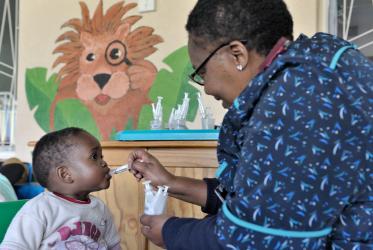Affichage de 81 - 100 de 156
Dialogue addresses improving HIV testing and treatment for children
10 Décembre 2018
Dr Cecile De Sweemer, the doer of God
30 Novembre 2018
WCC executive committee tackles public issues
07 Novembre 2018
Le Comité exécutif du COE aborde les questions d’actualité
07 Novembre 2018
WCC welcomes new staff
06 Novembre 2018
Congolese churches respond to Ebola outbreak
01 Juin 2018











